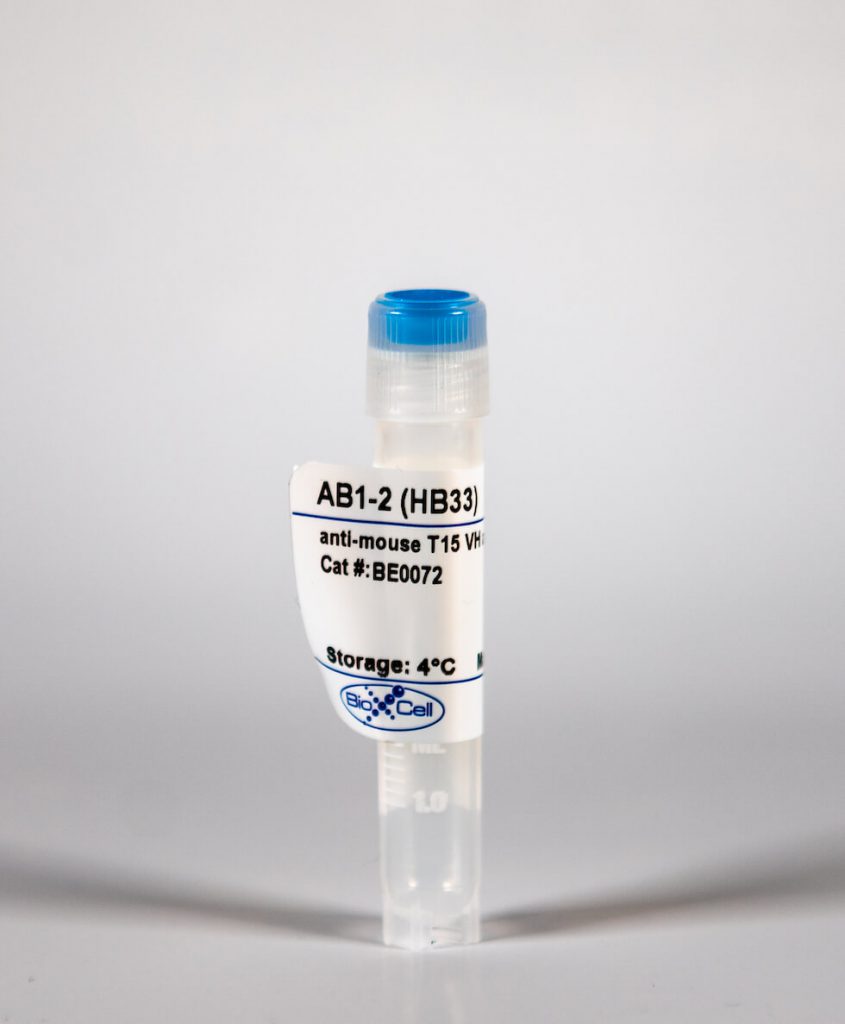InVivoMab anti-mouse T15 VH and T15 VL regions of IgM
| Clone | B1-2 (HB33) | ||||||||||||
|---|---|---|---|---|---|---|---|---|---|---|---|---|---|
| Catalog # | BE0072 | ||||||||||||
| Category | InVivoMab Antibodies | ||||||||||||
| Price |
|
The AB1-2 monoclonal antibody reacts with mouse IgM of the T15 idiotype. The AB1-2 antibody was raised against purified immunoglobulins from the MOPC 460, MOPC 5558 and HOPC 8 myelomas.
| Isotype | Mouse IgG1, κ |
| Recommended Isotype Control(s) | InVivoMAb mouse IgG1 isotype control, unknown specificity(BE0083) |
| Recommended InVivoPure Dilution Buffer | InVivoPure pH 7.0 Dilution Buffer(IP0070) |
| Immunogen | Purified antibodies from MOPC 460, MOPC 5558, and HOPC 8 myelomas |
| Reported Applications | ELISA |
| Endotoxin |
|
| Purity |
|
| Formulation |
|
| Sterility | 0.2 μM filtered |
| Production | Purified from tissue culture supernatant in an animal free facility |
| Purification | Protein G |
| Storage | The antibody solution should be stored at the stock concentration at 4°C. Do not freeze. |
| RRID | AB_1125545 |
| Molecular Weight | 150 kDa |
InVivoMAb anti-mouse T15 VH and T15 VL regions of IgM (Clone: AB1-2 (HB33))
Zhao, W., et al. (2015). "Macrophage-specific overexpression of interleukin-5 attenuates atherosclerosis in LDL receptor-deficient mice." Gene Ther 22(8): 645-652. PubMedInterleukin-5 (IL-5) increases the secretion of natural T15/EO6 IgM antibodies that inhibit the uptake of oxidized low-density lipoprotein (LDL) by macrophages. This study aimed to determine whether macrophage-specific expression of IL-5 in LDL receptor-deficient mice (Ldlr(-/-)) could improve cholesterol metabolism and reduce atherosclerosis. To induce macrophage-specific IL-5 expression, the pLVCD68-IL5 lentivirus was delivered into Ldlr(-/-) mice via bone marrow transplantation. The recipient mice were fed a Western-type diet for 12 weeks to induce lesion formation. We found that IL-5 was efficiently and specifically overexpressed in macrophages in recipients of pLVCD68-IL5-transduced bone marrow cells (BMC). Plasma titers of T15/EO6 IgM antibodies were significantly elevated by 58% compared with control mice transplanted with pLVCD68 lacking the IL-5 coding sequence. Plaque areas of aortas in IL-5-overexpressing mice were reduced by 43% and associated with a 2.4-fold decrease in lesion size at the aortic roots when compared with mice receiving pLVCD68-transduced BMCs. The study showed that macrophage-specific overexpression of IL-5 inhibited the progression of atherosclerotic lesions. These findings suggest that modulation of IL-5 cytokine expression represents a potential strategy for intervention of familial hypercholesterolemia and other cardiovascular diseases.






